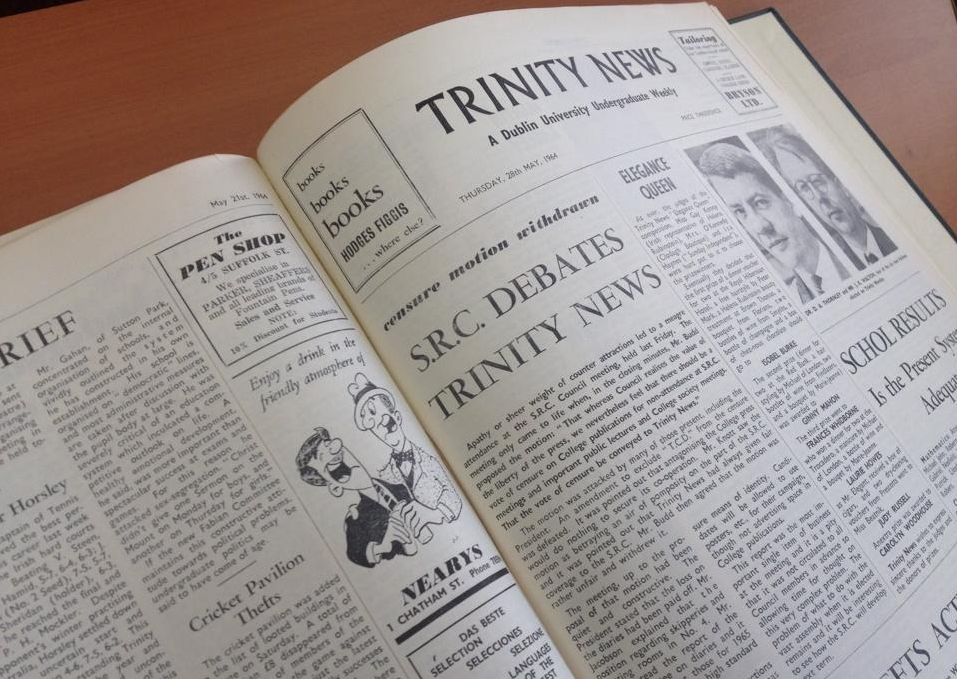
Despite this amity, the performance of the SRC was often a source of frustration during the 1960s. In 1963, the executive council was elected by a “handful” of voters, and low polls continued to be a problem throughout the decade. That said, “candidates who manned the polling booths were invariably successful” in the 1967 elections. TN put the disappointing turnout that year down to a lack of sincere campaigning, quoting a newly elected member of the council who felt particularly hypocritical: “For days I have professed an interest in the SRC, when in fact I know virtually nothing about it. My election was a bit of a mistake.” Another candidate’s post-election angst was more existential. The “philosophically inclined” Paul O’Mahony, one of two candidates whose late appearance on the ballot caused it to be postponed, was jealous of his rival Edward Meylicke, who received no votes. Apparently, O’Mahony “felt zero was a more powerful number than one.”
Resistance to change
The same year, the board made the decision to accept applications from candidates “only a) one of whose parents is a graduate of Trinity College, or b) who have a brother or sister at present attending the college, or c) one of whose parents was born in Ireland, or d) who are from under-developed countries.” Then president of the SRC’s executive council, Beverley Vaughn, condemned the move as “deplorable.” It seems TN felt a stronger reaction was in order, predicting “a decline in student vitality and a coming homogeneity in Irish university life.”
By the end of the decade, election season dissatisfaction seems to have intensified. In 1969, the initial round of elections were declared void as sachets of acid were “deposited” in some of the ballot-boxes, “destroying an unknown number of ballot papers.”
By the end of the decade, election season dissatisfaction seems to have intensified. In 1969, the initial round of elections were declared void as sachets of acid were “deposited” in some of the ballot-boxes, “destroying an unknown number of ballot papers.” When the elections were disrupted again a few days later, the returning officer decided to continue the election as only two ballot papers had been destroyed. The same month, members of Students for Democratic Action and the Young Socialists sought the “sanctuary” of Trinity in order to avoid the attention of Special Branch, following a restless demonstration against continued US involvement in Vietnam at the US embassy
Political rifts
The apparent advent of party politics in Trinity had come the year before and was met with similar levels of consternation. President Vaughn, though “unperturbed” by the group’s threats to his office, described the Candidates for Democracy, a group formed to campaign for SU reform, as “deplorable”. TN saw through the movement’s claims that its candidates were united by policy rather than ideology, reporting that many were known to be left-wing activists while another “large proportion” were republicans. Amidst the subterfuge, an unidentified member of the SRC defected to join the new democratic candidates. Meanwhile, Sinn Fein was recognised as a society by the CSC.
Reform of the SU was frequently mooted over election season during the 1960s and was sometimes a motivating factor for new student parties. Chris McGrath, an independent candidate in the arts constituency in 1968, reasoned that although Trinity should not be “divorced completely from politics,” its SRC should attempt to “change Trinity first and the world afterwards.” The electoral reforms introduced that year included the introduction of proportional representation and an end to the practice of voting “by proxy.” In this atmosphere, the Moderate Reform Party was formed the week before elections in the hope that “the good work which the SRC has done in the past will not be destroyed by bickering.” McGrath later denounced the party as “mainly reactionary.” The following year was the first in which president and vice president were to be offered sabbatical years, and candidates across the board “joined in an earnest appeal for an exceptionally high poll in order to demonstrate to the Board that their concessions have not been greeted apathetically.”
Personality politics
The college’s association with the Union of Students in Ireland (USI) was another recurring issue during the 1960s. In 1969, presidential candidate Adrian Bourke felt the formation of the Irish Student Employment and Travel Agency would mean the end of the USI. Later in the year, Mark Oxley claimed the subject of disaffiliation had been “fostered by (presidential candidate) Revington as a classic Harold Wilson trick to avoid discussing internal problems.” As Soviet ideologues exerted control over the USI, Revington argued the organisation was “completely divorced from student opinion.”
To further the case for disaffiliation, Revington referred to a recent conference in Galway at which Trinity delegates were so drunk that they couldn’t “perform any useful function.” Welfare officer, Ian Hamilton, responded by pointing out that only three out of the 14 delegates had been drunk “for any lengthy period of time” and that one had consequently had his voting card confiscated.
According to TN, the 1969 elections saw “slight lessening” in the importance of personality in campaigning. It seems the intimacy of the Trinity experience in the 1960s gave rise to enmity, as well as amity. Later that year, acrimony prevailed at a meeting of the SRC executive where standing orders had been removed to allow then-president Ciaran McKeown to speak. Many were subsequently taken aback when he opened the meeting by slamming the executive for not officially inviting him. McKeown made a hasty exit and the vice-president adjourned the meeting, stating it had been reduced to “personal mud-slinging vendettas that were of no use and certainly of no credit to the SRC.” In the elections that May, Trinity News comments that the victorious Revington (who seems to have been demoted by the time of this meeting) subdued his “usual effervescent self” in what was a “low-key campaign.” Contemporary readers are left to wonder what might have been.






